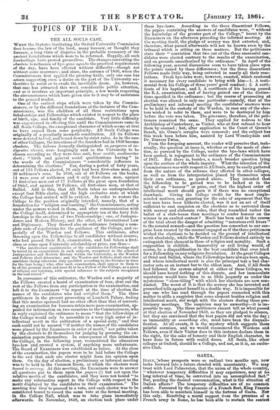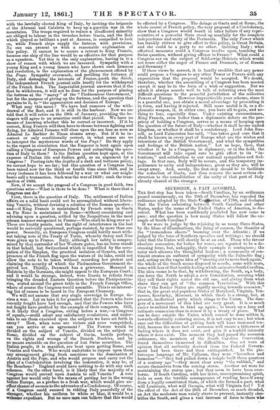GAETA.
ITALY, :whose prospects were so radiant two months ago, now looks forward into a future clouded with uncertainty. We may trust with Lord Palmerston, that the union of the whole country, " whatever temporary difficulties it may experience, may at no long interval of time, be converted into an accomplished. fact." But, pending the desired consummation, what is the situation of Italian affairs ? The temporary difficulties are of no common order. Favoured by the presence of a French fleet, King Francis has been able to maintain himself in the fortress of Gaeta. Nor this only. Receiving a moral support from the presence of a French army in Rome, he has been able to sustain the contest with the lawfully elected King of Italy, by inciting the brigands of the Abruzzi and Calabria to keep up a guerilla war in the mountains. The troops required to reduce a disaffected minority are obliged to labour in the trenches before Gaeta, and the fleet which played so brilliant a part at Ancona, is compelled to look on, while French ships supply the fortress with provisions. No one can present us with a, reasonable explanation of this policy. It cannot be to secure a retreat to King Francis, because one ship of the line would be as effective for that purpose as a squadron. Yet this is the only explanation, having in it a show of reason with which we are favoured. Sympathy with a young King and a young Queen who have shown such firmness and resolution, is the explanation of the phenomenon offered by the Pays. Sympathy overmuch, and perilling the fortunes of Italy, and damaging the interests of France, quoth the Siirle. The independent French journal calls loudly for the withdrawal of the French fleet. The Imperialist journal answers that if the fleet be withdraw; it will not be done for the purpose of placing the fortress at the " mercy " of the "Piedmontese Government," but for the purpose of giving up the fortress, and the question that pertains to it, to " the appreciation and decision of Europe." What may this mean ? We have had rumours of the with- drawal of the fleet, and it is still in the harbour. Now we are told that it will retire on the 19th of January, providing the be- siegers will agree to an armistice until that period. We have no means of knowing whether this be correct or incorrect. If it be correct, King Francis will then have to choose between fighting and flying, for Admiral Persano will close upon the sea face as soon as Admiral Le Barbier de Tinan steams away. But if it be in- correct or only conditionally correct, in what sense are we to interpret the mysterious words of the Pays? Do they apply to the report in circulation that the Emperor is bent again upon calling a Congress of European Powers and submitting the ques- tion of Italy to. them ? Is the Italian question kept open, at the expense of Italian life and Italian gold, as an argument for a Congress ? Peering into the depths of a dark and tortuous policy, we cannot hope to see far; but this question of a Congress has been raised now for the third or fourth time since 1868, and in every instance it has been followed by a war or what our neigh- bours call a transaction. Such was the war of 1859; such the tran- saction of 1860.
Now, if we accept the proposal of a Congress in good faith, two questions arise—What is there to be done ? What is there that a Congress can do ? First, there is the question of Italy. The settlement of Italian affairs on a solid basis could not be accomplished without libera- ting Venetia, without devising a solution of the Roman question ; and—if King Francis is maintained by French arms in Gaeta as Pio Nono is maintained in Rome—without considering and advising upon a question, settled by the Neapolitans in the most solemn manner recognized in France—Who shall be King over us ? These are knotty point.% and the right of interference in the last would be seriously questioned, perhaps resisted, by more than one power. Secondly, an European Congress could hardly meet with- out taking note of the Treaty of Turin, whereby Savoy and Nice were given up to France. Italy, although her safety is compro- mised by that surrender of her Western gates, has no locus standi in that behalf, but Switzerland which is imperilled by the occu- pation of the Simplon, the practical isolation of Geneva, and the presence of the French flag upon the waters of its lake, could not allow the note to be taken without recording her protest and claiming the security of which the Piedmontese Government de- prived her. Thirdly, Denmark has a grievance. Menaced in Holstein by the Germans, she might appeal to the European Court ; and it would be strange, indeed, were Russia to refrain from bringing the dreaded Eastern Question before the Plenipotentia- ries, seated around the green table in the French Foreign Office, where of course the Congress would assemble. This is an interest- ing list of causes to be heard in the European Chancery. We will not assume that any single sovereign in Europe de- sires a war. Let us take it for granted that the Powers who have recently fought have had enough, and that the Powers who have not fought have profited by the example of their compeers. Still, is it likely that a Congress, sitting before a war,—a, Congress of equals,—could adopt any satisfactory resolutions, and under- take to see them executed upon the subjects we have set forth in array ? How, when none are victors and none vanquished, can you arrive at an agreement ? The Powers would be divided on the subject of Venetia, divided on the subject of Rome, divided on the subject of Gaeta, hostile perhaps, on the rights and wrongs of the Danish Duchies, and by no means amicable on the question of lost Swiss securities. The Italian people, it is manifest, are bent upon getting Rome, and Venetia and Gaeta. Who would undertake to impose upon them any arrangement giving fresh sanctions to the domination of Austria and the Pope, and who would propose and carry out the plan of a Confederation involving the restoration, it may be, of the Bourbons ? England could have nothing to do with any such schemes. On the other hand, is it likely that the majority of a Congress would prevail upon Austria to sell. Venetia ? A vote against her would only be the means of putting her in the wrong before Europe, as a preface to a fresh war, which would give an- other chance of success to the advocates of a Confederacy. Of course, if a Congress could succeed in ridding Italy peacefully of the stranger, whether his uniform be white or blue, it would be a welcome expedient. But no sane man can believe that this would
be effected by a Congress. The doings at Gaeta and.at Rome, the whole course of French policy, the very proposal of a Confederacy, show that a Congress would result in utter failure if any repre- sentative of a powerful State stood up manfully for the complete independence and unity of the Peninsula. The only Power which has frankly striven to give effect to this policy, is Great Britain, and she could be a party to no other. Quitting Italy ; what effectual measures could a Congress resolve upon, touching the Swiss question, without giving offence to France ? What could a Congress say on the subject of Schleswig-Holstein which would not rouse either the anger of France and Denmark, or of Russia and Germany ?
If these views be correct, it is hardly credible that any power could propose a Congress to any other Power or Powers with any expectation that the proposal would be accepted. We doubt, therefore, whether the assembling of a Congress has been mooted except it may be in the form of a wish or suggestion. But we admit it always sounds well to talk of referring even the most difficult questions to the peaceful jurisdiction of the collective Powers of Europe. However impracticable your scheme, since it is a peaceful one, you obtain a moral advantage by presenting it in form, and having it rejected. Still more useful is it, as a dit- plomatic weapon, if, in either case, you have all to gain, and no- thing to lose, especially time. Under existing circumstances, King Francis, even better than a diplomatic debate on the pro- priety of holding a Congress, serves as a means of keeping open the question of the future of Italy—whether it shall be one united kingdom, or whether it shall be a confederacy. Lord John Rue- sell, as Lord Palmerston has said, "has taken good care that it shall be known in every part of Europe what are the wishes and intentions of the British Government, and what the sympathies and feelings of the British nation." Let us hope, then, that whether it be in a Congress, in diplomacy, or in the field, the Government will take equal care to give effect to its "in- tentions," and satisfaction to our national sympathies and feel- ings. In that case, Italy will be secure, and the temporary im- pediments to unity and independence, great as they are, will be swept away. And, surely, the first step should be to facilitate the reduction of Gaeta, and thus remove the most serious ob- struction to the consolidation of the unity of that part of Italy already cleared of the stranger.



























 Previous page
Previous page